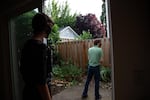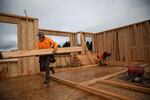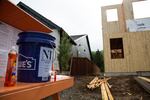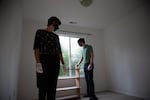Colton Magill touched a gloved hand to the kitchen island of what could have been his future home. He liked the space for cooking, he said, then quipped that nobody sets out cookies at showings anymore.
“That’s my main disappointment with COVID so far – no cookies at the houses,” he joked to his real estate agent.
It was one of the few tell-tale signs of the pandemic during Magill’s tour of a 1,500-square-foot townhouse in Beaverton. He and his agent wore gloves and stayed distanced. They stood on opposite ends of a bedroom while he eyeballed it, ultimately deciding it was too small for his little brother.
“I want him to have a little space, that way he doesn’t feel cramped,” Magill, a 24-year-old accountant, said from behind the cloth mask.

Colton Magill tours a home in Beaverton with his agent, Megan Jumago-Simpson. Magill is not unique for buying a home during the pandemic.
Troy Brynelson / OPB
It was a slice of the new normal of buying homes. Three months into the COVID-19 pandemic, home buying looks familiar enough that builders, brokers and real estate experts aren’t forecasting a crash similar to the 2008 recession.
Instead, with fewer listings on the market and buyers’ demand growing, they are expecting steady home sales and even rising values in the coming months.
Although home sales dropped earlier this year, recently released data signals that housing markets in the Portland metropolitan area and Southwest Washington rebounded in May. Fewer people are listing their properties, but would-be buyers made almost as many offers as they did in May 2019.
The pandemic and government intervention did dampen activity in March and April, but people continued to book online meetings, do virtual tours and house-hunt online, experts said.
James Young, director of the University of Washington Center for Real Estate Research, said the market is still hot because interest rates are still low, millennials are still settling down and baby boomers are still looking to downsize.
“There’s a whole lot of things that haven’t changed, and I think that’s what we have to keep in mind here,” Young said. “If anything, it’s put those trends in warp speed.”
The ways the market has changed – and the ways it is still the same – are apparent in Ridgefield, one of the fastest growing cities in Washington state. Building the homes may be different, but they’re selling just as quickly.

A home is under construction in Ridgefield in May. Homebuilders say they sales are going well during the pandemic, but are less certain about the future.
Troy Brynelson / OPB
Under an overcast sky one morning in May, three construction workers with New Tradition Homes prepared to place trusses on the second story of an unfinished house that will eventually be listed for around $450,000. State guidance called for workers to stay 6 feet apart, an easy ask according to Caleb Blanton, a sales manager.
“For a framing crew like this, in the open air, it’s fairly easy to maintain that,” he said.
The other noticeable guideline sat near the road: a workbench with a sign-in sheet for contact tracing, if it becomes needed, and a tub of hand sanitizer.
Other than that, Blanton described the site as business as usual. The firm had about 80 homes under construction, mostly in Ridgefield. And the company sold almost identically the same number of homes from March through May of this year as they did last: 55 versus 58.
“There’s not a lack of buyer confidence,” Blanton said. Confidence only revs up as businesses come online, he added.
“We have a clear path that this will end,” he said. “From federal to state to local, they’re saying, ‘Hey, this is temporary. Let’s flatten the curve, and then we will get back to normal.’”

A home is under construction in Ridgefield in May. Homebuilders say they sales are going well during the pandemic, but are less certain about the future.
Troy Brynelson / OPB
Sitting in a finished house less than a mile away, Michael Shanaberger of Romano Home Construction, echoed those statements. The company gets fewer walk-in customers, he said, but books more phone calls and online meetings.
“I’m busier now than I was before,” he said. His firm typically builds about four houses every month, with the least expensive selling for $320,000. He said the company sold seven homes in March and April, when pandemic anxiety was at its zenith.
Those fortunes have not been universal.
Buying slowed at the start of the pandemic throughout the Portland metropolitan area and Southwest Washington, data from the Regional Multiple Listing Services show. As buying slowed, fewer people also put their homes on the market.
That trend played out across the country, said Mike DelPrete, a real estate consultant and academic with the University of Colorado-Boulder. “Because of the pandemic and the restrictions, people just couldn’t transact real estate – or they didn’t feel confident transacting real estate.”
The freeze has already begun to thaw. In May, more homes have returned to the market and more offers are being made. DelPrete said that's also occurring in other markets similar to Portland, like Denver and Austin.
“I think what you’ll start to see is an influx in homes hitting the market,” he said. “All of these backed-up homeowners who wanted to sell, who were waiting, now they’re going to bring their homes to market.”
But the pandemic has made the future less certain than ever.
COVID-19 diagnoses could surge, and that could lead to government intervention once again. Homebuilders could once again find themselves having a difficult time building and completing houses.
Blanton said his firm currently has enough construction permitted and under way that, at this rate, it won’t face a bottleneck for a few months. He’s banking that Clark County enters Washington's reopening Phase 3 during summer.
“The longer anything goes, the more unknowns there is,” Blanton said. But he stayed optimistic. “With rates being kept so low, if you’re in the market, it’s a great time to get in.”

Colton Magill tours a home in Beaverton with his agent, Megan Jumago-Simpson. Magill is not unique for buying a home during the pandemic.
Troy Brynelson / OPB
Still, it’s not clear how widespread unemployment and market disruptions could affect the future for people looking to buy a home, DelPrete said.
“How can anybody be confident about what’s going to happen?” he said. “The key takeaway is, nobody knows how this is going to play out. There’s a lot of uncertainty – and uncertainty is affecting everything.”
Housing is one of the clearest examples of the seesaw of supply and demand. If buyers are hungry now, it’s tilted in favor of people selling homes.
Terry Wollam, a managing broker in Vancouver, Washington, said that situation could drive prices further up in a region that has already seen rising home prices in recent years.
“We are seeing less housing options for buyers to choose from, and some bidding for homes going above asking price, which in turn will drive up home prices as a whole for the area,” he said.
Such was the case for Magill, the accountant looking at the Beaverton townhouse.
Because more buyers are returning to the market, Magill's broker, Megan Jumago-Simpson, said she was trying to be more aggressive and to visit any home that caught Magill’s eye within a day or two.
“We’re going to see it the same day or the following day and kind of jumping on them,” she said.
The second townhouse Magill saw that day was two blocks away and $14,000 cheaper. He put an offer down the next day.
In the end, he was competing against other offers, and agreed to raise his bid — $14,000 above listing.